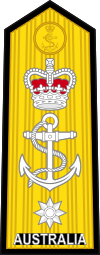One-star rank
An officer of one-star rank is a senior commander in many of the armed services holding a rank described by the NATO code of OF-6. The term is also used by some armed forces which are not NATO members. Typically, one-star officers hold the rank of commodore, flotilla admiral, brigadier general, brigadier, or in the case of those air forces with a separate rank structure, air commodore.

Officers of one-star rank are either the most junior of the flag, general and air officer ranks, or are not considered to hold the distinction at all. Specifically, in many navies, one-star officers are not considered to be flag officers, although this is not always the case. The army and air force rank of brigadier general is, by definition, a general officer rank. However, the equivalent rank of brigadier is usually not designated as a general officer. The air force rank of air commodore is always considered to be an air-officer rank.
Australia
In the Australian Defence Force the following ranks of commissioned officers are awarded one-star ranks:
- Commodore (Royal Australian Navy one-star rank)
- Brigadier (Australian Army one-star rank)
- Air commodore (Royal Australian Air Force one-star rank)
Canada
- Commodore (Royal Canadian Navy one-star-equivalent rank)
- Brigadier-general/brigadier-général (Canadian Army and Royal Canadian Air Force one-star-equivalent rank)
The maple leaf appears with St. Edward's crown and crossed sabre and baton.
Before unification in 1968, the rank of air commodore was the one-star rank equivalent for the Royal Canadian Air Force, and brigadier for the Canadian Army.
Germany
Army and Air Force:
- Brigadegeneral (brigadier general)
- Generalarzt ("surgeon general")
- Generalapotheker ("pharmacist general")
Navy:
- Flottillenadmiral ("flotilla admiral")
- Admiralarzt ("surgeon admiral")
- Admiralapotheker ("pharmacist admiral")
India
- Air commodore (Indian Air Force one-star rank)
- Brigadier (Indian Army one-star rank)
- Commodore (Indian Navy one-star rank)
- Deputy inspector-general (Indian Police Service one-star rank)
Indonesia
- Brigadir Jendral (Brigadier-General) - Indonesian Army, Indonesian Marine Corps and Indonesian National Police one-star rank
- Laksamana Pertama (Commodore) - Indonesian Navy and Indonesian Maritime Security Agency one-star rank
- Marsekal Pertama (Air commodore) - Indonesian Air Force one-star rank
Pakistan

- Air commodore (Pakistan Air Force one-star rank)
- Brigadier (Pakistan Army one-star rank)
- Commodore (Pakistan Navy one-star rank)
- Deputy Inspector General of Police (Pakistan Police one-star rank)
- Deputy Inspector General of Prisons (provincial prison service One-star rank)
Philippines
- Brigadier General (Philippine Army one-star rank)
- Brigadier General (Philippine Air Force one-star rank)
- Commodore (Philippine Coast Guard one-star rank)
- Commodore (Philippine Navy one-star rank)
- Police Brigadier General (Philippine National Police one-star rank)
- Fire Chief Superintendent (Bureau of Fire Protection one-star rank)
- Jail Chief Superintendent (Bureau of Jail Management and Penology one-star rank)
United Kingdom
- Commodore (Royal Navy one-star rank)
- Brigadier (British Army and Royal Marines one-star rank)[1]
- Air commodore (Royal Air Force one-star rank)[2]
United States
.jpg)
- Rear admiral (lower half) (United States Navy, Coast Guard, Public Health Service Commissioned Corps and National Oceanic and Atmospheric Administration Commissioned Corps one-star rank)
- Brigadier general (United States Army, Marines and Air Force one-star rank)
Other naval one-star ranks
In the modern naval services of Belgium, Denmark, Finland and Sweden, the one-star rank is flotilla admiral.
See also
References
- British Army - Ranks
- RAF Glossary Archived 2008-04-13 at the Wayback Machine


